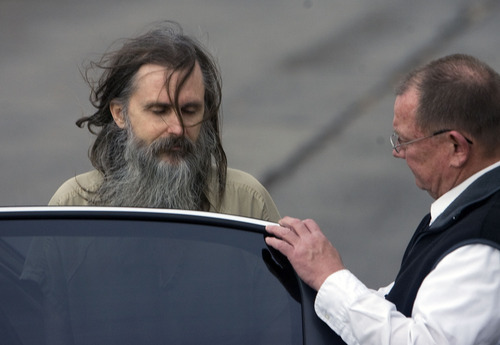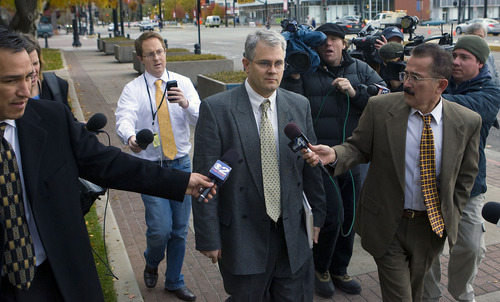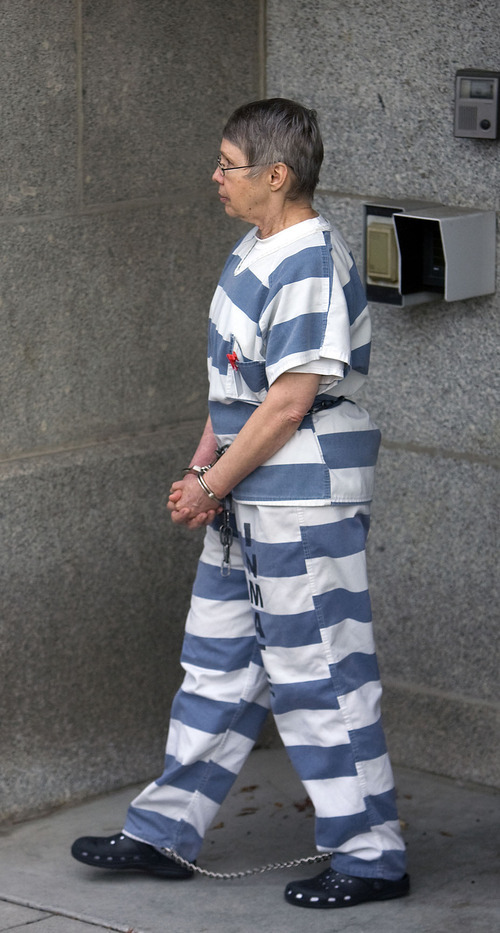This is an archived article that was published on sltrib.com in 2010, and information in the article may be outdated. It is provided only for personal research purposes and may not be reprinted.
Wanda Eileen Barzee testified Thursday that Brian David Mitchell's religious revelations controlled almost every aspect of their marriage.
Barzee said a series of "priesthood blessings" expressing "the Lord's will" — as interpreted by Mitchell — told them where to live, when to move and even how much money to take on a hitchhiking journey across America.
Testifying for the defense at her husband's kidnapping and sexual-assault trial, Barzee told a U.S. District Court jury that a revelation in 1995, while they were living in Idaho, precipitated their break from mainstream society.
"Brian went for a walk one day, and there wasn't any way to pay for our trailer, so he came back and said it was the Lord's will that we sell everything we own and buy backpacks and tents and sleeping bags and go hitchhiking across the nation," Barzee testified.
Barzee, a key witness in the trial, is expected to testify again Friday about an even more life-altering revelation: that she and Mitchell were to take seven plural wives as part of Mitchell's assignment from God to restore the true church to Earth during an end-of-times battle with the Antichrist.
That revelation purportedly prompted Mitchell to abduct then-14-year-old Elizabeth Smart from her Federal Heights home at knifepoint in June 2002. Smart has testified that Mitchell and Barzee held her captive for nine months, which included a trip to San Diego and back to Salt Lake City, and that Mitchell raped her almost daily.
Barzee, who was found competent after being forcibly medicated with anti-psychotic drugs, pleaded guilty to the crimes and is serving 15 years in a federal prison. Mitchell's conviction in the current trial could mean life in prison for him.
But Mitchell's defense team claims the 57-year-old should be found not guilty by reason of insanity, which would likely mean indeterminate incarceration at a mental health facility.
Throughout Barzee's testimony, defense attorney Robert Steele sought to show that Mitchell was obsessed with religion to the point that he didn't know right from wrong when he kidnapped Smart.
But prosecutors, and the now-23-year-old Smart, claim Mitchell merely uses religion to get what he wants: sex, alcohol and money.
Barzee — gray-haired, 65 years old and wearing gray-and-white-striped jail garb — spoke quietly and quickly, repeatedly rambling far from the questions posed by Steele. But she nevertheless outlined the basics of her life with Mitchell, which began when they met in a divorce-therapy group in 1985.
"I poured my heart out with what was bothering me," testified Barzee, who said she had been in an abusive marriage to another man for 20 years. "Brian … held my hand. We held hands from then on."
They married nine months later, on the day Mitchell's divorce from his second wife was finalized.
Of their first year of marriage, Barzee said, "It was hellish."
She said Mitchell was "possessive of me and controlling."
"Brian would say he would become consumed in fear and doubt," Barzee said. "He would never talk to me about what he was fearful of. He would get angry and we would get in an argument, and he would leave the house before he got so violent that he would hurt somebody or destroy something."
But Barzee said her Church of Jesus Christ of Latter-day Saints bishop gave her a blessing and told her "Satan was going to do everything in his power to stop us. And the Lord would give me patience to work with Brian and work out our problems."
Barzee said that, throughout the years, things got somewhat better, but the couple again sought help from their bishop in 1992. The bishop told them about "horses working together, that they have to work together in order to get along, and that seemed to click something in Brian. We were fighting less, and I learned to be submissive and obedient."
The following year, Mitchell told Barzee it was the Lord's will that he quit his job as a tool-and-die maker at O.C. Tanner, where he had decided he was "making and selling idols."
Mitchell said he was to begin teaching "the science of lymphology," a cell-cleansing form of massage that also involves bouncing on a trampoline. A side benefit, she said, was that because lymphology founder C. Samuel West ran his organization like a church, "you didn't have to pay taxes."
They sold everything, bought a fifth-wheel trailer and moved to Heber.
About that time, Mitchell told Barzee, an accomplished organist, that she was going to play the instrument "for the hosts of heaven and Jesus Christ."
Four months later, "Brian looked at the map and felt we should go north," Barzee said. "He didn't know where, but he just thought the Lord would reveal it to us … the angels would be with us."
They ended up at a commune made up of LDS families in northern Idaho.
But after Mitchell had religious disagreements with commune members, they moved into the nearby town of Kooskia in the spring of 1995 and stayed on property owned by Betty and Thomas McKnight.
Thomas McKnight testified that Mitchell got a reputation for being able to heal animals by waving his hands over them. He recalled that a neighbor with a bloated cow sought Mitchell's help.
"I heard later the cow did die," McKnight said.
McKnight said he usually listened politely to Mitchell's forcefully stated views on religion. But on a fall day in 1995, Mitchell was criticizing LDS Church leaders, and McKnight responded: "Brian, you've got to change your ways, or you're going to hell."
Within three weeks of that encounter, Mitchell and Barzee had sold everything they owned — except a trailer they had stopped making payments on — and walked away carrying only backpacks.
Barzee said she documented their travels in a journal titled, Journey Through the Land, which she said she "felt inspired" to pen with her less-dominant left hand.
She said they stayed for about five months in the Santa Cruz Mountains near Palo Alto, Calif., where they built a handcart that they later pulled across the Golden Gate Bridge. In Redding, Calif., Mitchell had a revelation that they weren't going to pull the handcart much longer, Barzee said, and soon after, they gave it to a Catholic charity.
Mitchell's next revelation was to "go back East" and visit Mormon historical sites.
Barzee said their "instructions" from the Lord were to take camping gear and $300.
"If we couldn't get $300, we were only to take $200, and if we couldn't get $200, we were to take $100."
Along the way, Barzee said, she received a blessing from Mitchell that she would play organ recitals in "humble" churches in Boston, Philadelphia and New York City.
"The Lord gave me 21 days to play three recitals," Barzee said, adding that, at one church, she felt "Satan's power to cause me to quit playing, but … we kept playing the recital and got through that."
Testimony from Mitchell's brother
Tim Mitchell, who is a mental health counselor in Logan, recalled Thursday that, as a boy, his older brother was a "creative person who always seemed to have some fun or interesting project going on."
The projects included ambitious things such as building a roller coaster using plywood and a wagon, or making a hot-air balloon that landed on a neighbor's roof and briefly set it afire.
But as the years passed, Tim Mitchell told jurors, his brother went through dramatic transformations. They included falling away from the LDS Church, a "spiritual conversion" that brought him back into the fold, and a final rejection of both the church and mainstream society.
Tim Mitchell said there was a point about five years before his brother allegedly abducted Elizabeth Smart in 2002 when he was hinting at having revelations and asking people to call him David (pronounced da-VEED).
"I said, 'I'm not going to call you David because I don't believe that,' " Tim Mitchell testified. "I think you're going off the wrong way."
Tim Mitchell added: "I sent him a letter there, and I was thinking this is really looking like mental illness. I sent him some letters encouraging him to get some help."







